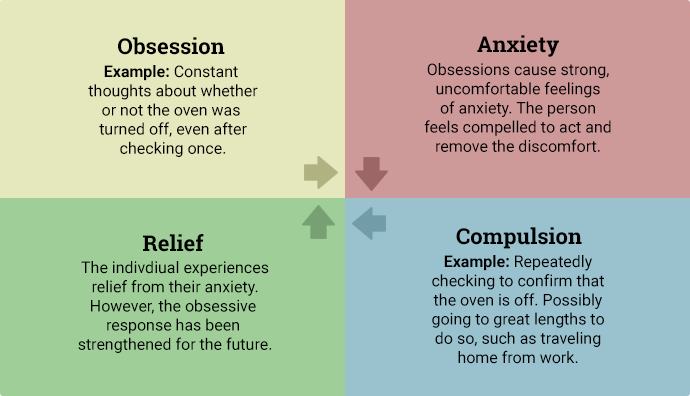Obsessions Part Two
In order for us to fully understand why an Obsession can occur, we have to discuss those myths I mentioned previously...
- Magical Thinking Myth: This is where a person with OCD will believe that just because they thought of something - anything - that it will happen. A lot of times our thoughts or behaviours will be considered illogical. It is because we tend to be separate or isolated from others and form our own reality in which many things that you know to be true and have logic to back it up - well your OCD will still tend to twist it around to make it where you still are forced into the cycle of OCD.
Reminder - Obsessions ➡ Anxiety➡ Compulsions➡ Relief ➡ And Repeat!
So this myth is an illogical one, yet most of us still have to work on it to stop us from believing it to be true. Magical Thinking is exactly as it sounds, that there is a connection between your thought on an event and the likeliness of it actually happen. We all know that we can't predict the future and that our choices and actions determine what happens next. Not our thoughts. Our thoughts cannot just make something happen. How often does something you think about truly come to be? You think of having cancer - will it happen? Who knows. There is no way for us to predict these things yet we reinforce these predictions/thoughts by our feelings and the way our body reacts - anxious, worried, etc. Eventually building into an obsession. We do not look at the valid evidence that suggests otherwise because we have already entered the OCD cycle and we are going to have to break it before we can stop this easy to fall for mistake from occurring again.
- Having Control over your Thoughts : This one is the one I struggle with the most. It's where you think that in order to manage your OCD all you have to do it control your thoughts. For, if you don't have one of your intrusive thoughts then you won't have to feel the anxiety or perform the compulsion. It is the belief that, by controlling the thoughts in your head, your OCD is cured. This is seriously not true. Because for one, there is no possible way you can control every thought that flows through your mind. It has been proven, that we as humans are very poor at controlling our thoughts. Another fact is, we have millions of thoughts, ideas, images, etc. that our brain processes daily. How are we to find the source of where all these things come from to stop it - to control it? It really is not possible. The risk with this belief for people with OCD is something called Thought Suppression. It's where we find our Obsessional thoughts or a specific unwanted thought and try to stop ourselves from having them. This only increases the chance of us having to deal with this thought for even if we were to suppress it for awhile, we are actually still thinking about it in order to keep it back. So the result of this is that thought coming back but now we have made this connection to this specific thought with reason for not wanting to think about it. So our OCD will consider it a threat, making us more and more anxious - thus the OCD cycle will begin.
- It is BAD to have BAD thoughts : Now this myth is simply not true. As I have pointed out, we as humans have millions of thoughts go through our heads when we are both awake and sleeping. Now, if we believed that not even one of those thoughts we had was bad that would be simply miraculous. Yes, everyone has bad thoughts. It's what helped the creative sector - like books, films, artwork - grow. There are books and movies based on bad things happening. Artwork with the pain and suffering of the artist on display. The thing with bad thoughts is our ability to think it through. We are fortunate to be able to think about anything we want and decide on the course of action based on our thoughts. We are not forced into having to act on our thoughts. So for us with OCD, these thoughts might become an obsessions because we see them as a threat and will be anxious having to deal with them. Yet, everyone has unpleasant thoughts about actions or objects that are considered bad and even with these thoughts most don't act on them or they are just random thoughts that were triggered in our heads by something around us. People with OCD will struggle a lot in this area because, yes, these thoughts could be a threat if acted on or even just having to be stuck on such a thought will make your body react. Anxiety, shame, guilt, and worry will be present in these moments but do not think that you alone suffer from these thoughts. We all have them, even me. Nobody is spared from having bad thoughts and just because we do have these thoughts does not mean it is bad. It is just normal. You are just a normal human dealing with thoughts the same as everyone else. The only difference is, that we will have to deal with the consequences our OCD does to us with these thoughts.

